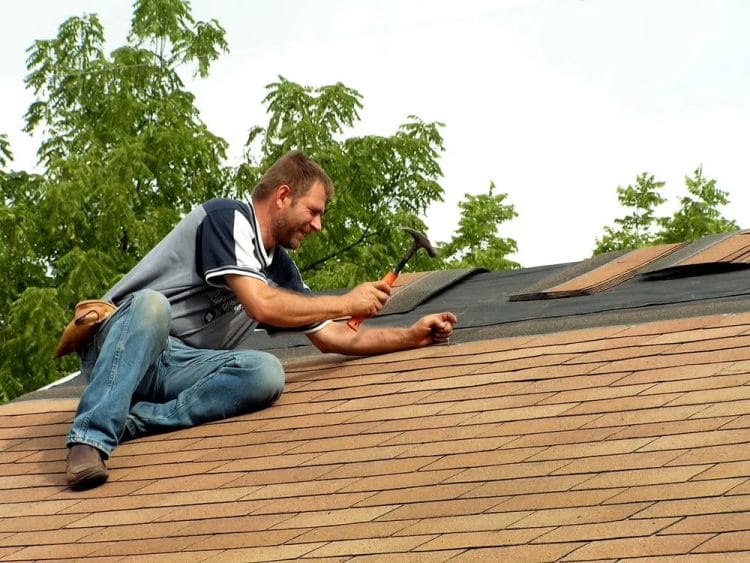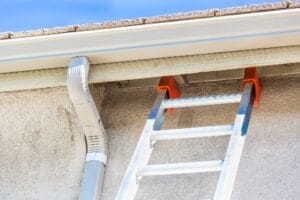Replacing your roof can feel like an expensive home repair, but it can come with a tax benefit to help offset your initial costs during the replacement.
When deciding on what to do about a roof that’s showing its age or in need of replacing, you’ll consider plenty of details before deciding on the best solution. Knowing what can help you receive a tax credit can lead you to the best new roof for your home—and some money savings.
Today we explore roofing basics that can help you get the best tax benefit from your new roof!

A New Roof Can Help Reduce Your Taxes
Whether you want to replace your roof or not, it might be worth it to help your taxes for the year. If you’ve been putting off a replacement, you’re risking damage to your home that can become an expensive repair beyond the roof replacement.
We understand that it’s a financial commitment to hire a contractor and pay for a new roof. However, knowing that your roof can qualify as a tax credit could sweeten the deal for you.
What Is a Home Improvement?
The IRS considers significant updates to your home as a “capital improvement.” However, a roof replacement doesn’t usually fall under that category as a tax credit for residential properties—but that’s not the only way to receive a credit on your home.
A new roof can still become a worthwhile benefit when it’s time to do your taxes—if your new roof meets specific energy-efficiency criteria.
How can you be sure your new roof qualifies for the tax credit? A simple repair won’t be eligible. You need a full replacement, and it’s critical to choose the right materials and options. Work with your contractor and do your research to use a roof replacement to reduce your taxes.
Be Sure It’s an Energy Upgrade
To qualify for a tax credit, your new roof must meet the criteria as an energy upgrade. The tax credit targets improvement in the energy efficiency of your home rather than rewarding homeowners for merely buying a new roof.
Specifically, your new roof needs to qualify for the Residential Energy Tax Credit. Your professional roofing contractor can help you choose roofing materials that help you qualify.
What Materials Qualify?
If you’re planning a low-cost roof replacement to save money, you might miss out on the tax credit. You don’t have to overspend on an expensive roof, but you’ll need to purchase roofing materials that meet the energy-efficiency criteria of the tax credit.
In general, two types of roofs can qualify for a tax credit.
- Metal roofs with a coating of with Energy Star certified pigment or paint. The coating is a requirement to qualify for the tax credit. If you’ve ever wondered what it would be like to have a metal roof, it might be worth a try!
- Asphalt roofing material that consists of cooling granules. While asphalt shingles are some of the most common roofing materials, not all asphalt shingles or materials contain these granules. Make sure your contractor can provide these specific types of asphalt shingles.
The cooling granules and Energy Start certified paint helps deflect heat from the sun to keep your home cooler. This helps reduce your energy bills and meets the criteria for the home improvement energy tax credit.
How Much Is the Credit?
Homeowners who purchase qualifying roofing materials can receive a credit of up to 10% of the cost of replacement. While it might not be not a significant amount, every little bit can help reduce your overall tax burden.
Plus, when you apply energy-reducing materials to your new roof, you’ll save money on lower energy bills for as long as you live in your home.
Watch the Timing
The tax credit doesn’t last forever, and it only applies to work performed during specific calendar years. If you wait too long to schedule a roof replacement, you might miss your opportunity for a tax credit.
Tax rules can change from year to year. Be sure to consult a tax professional to confirm the most current rules, replacement work, and filing details to receive the tax credit for your roof.
You might qualify for a tax credit if the roofing replacement work took place and ended between 2019 through the end of 2021. If you’re thinking about a roof replacement, don’t delay! It’s time to reach out to a professional contractor and talk about your options with a tax credit in mind.
Are There Any Other Benefits?
Besides the tax credit, a new roof is an excellent way to improve your home. If it’s been more than 20 years since your last new roof, it’s time to consider another replacement.
Your roof includes the gutter system that helps direct water away from your home’s foundation. Over time, your gutters and roof can become ineffective from wind, rain, pest infestation, and the deterioration of your roofing materials.
A roof can last for a long time, but it can’t last forever. A new roof can help keep your home safe from mold, mildew, rodents, and high energy bills. A complete roofing replacement includes new gutters to work as a system with your roof.
When choosing materials that help your roof qualify for an energy improvement tax credit, you also improve the health of your home. It’s critical to let an expert roofing contractor help you choose the materials that can help you qualify for a tax credit, and that works best for the slope of your roof and design of your house.
Roofing Basics Help You Save Money
A roof replacement isn’t an easy decision! Even with an understanding of roofing basics, the right professionals can make the process less stressful for you.
The Fitz Roofing team is here to help you choose the ideal roof for your home! If we can help you qualify for a tax credit, we provide that insight during the consultation process. Contact us for a free estimate!





